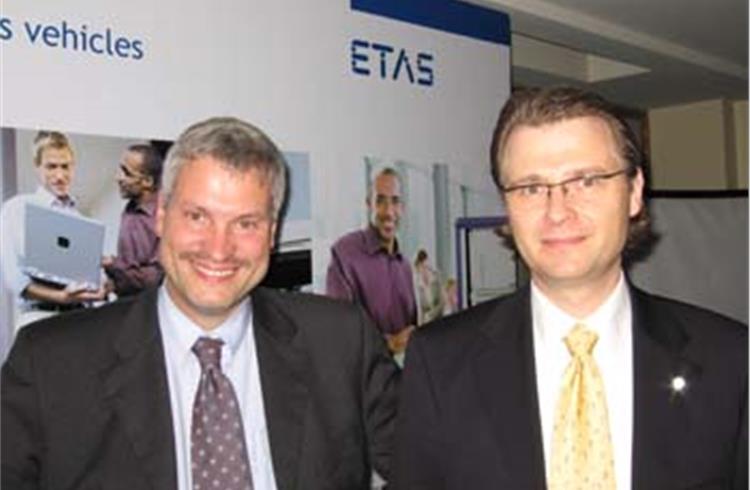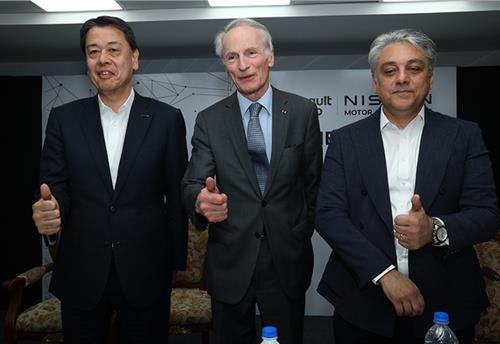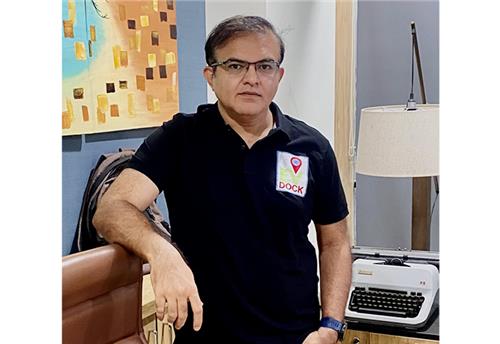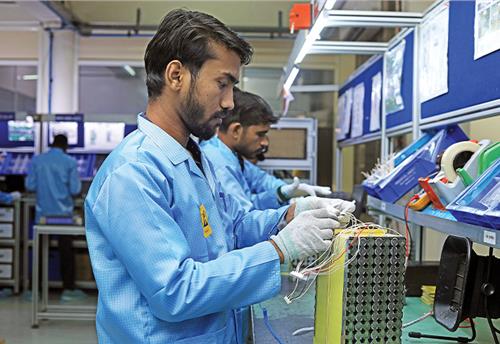ETAS eyes larger slice of control units market
The Robert Bosch subsidiary targets sales of euros 10 million by 2010 from the increasing demand for electronic control units. Story: T Murrali.
Speaking at the inauguration of the company’s office in Bangalore, Wolfgang Sienel, managing director, ETAS Automotive India said that the introduction of Euro 4 norms in urban centres by 2010 would spur demand for more embedded control systems in automobiles and his company hoped to leverage this demand. Although it is only officially entering the country now, ETAS has been catering to the needs of Indian OEMs since 1999 through MICO. This association is made possible by the fact that both companies – ETAS and MICO – are owned by Robert Bosch GmbH.
Thus, ETAS already caters to the needs of Ashok Leyland, Mahindra & Mahindra and Tata Motors. Sienel said that a full-fledged Indian operation would enable his company to provide end-to-end solutions from concept till the end of the project.
COMPLETE PORTFOLIO
Globally, the ETAS group offers four major services: control functions, diagnostic functions, ECU software and end-of-line (EOL) testing, and it will offer all these to Indian OEMs as well. “Our entry into India has given us the opportunity to take up several initiatives including developing appropriate tools, products, interface and required add-ons. This will eventually push forward the design and development process for the OEMs,” Sienel said.
Moving closer to the customers has been a global strategy and this, Sienel added, would help his company grow with the automotive industry here. As elsewhere, the challenge in India would include developing and servicing the increasingly complex embedded systems that go into vehicles. Sienel said that although products were standardised to a large extent, the peripheral systems still needed to be customised as per the specific requirements of individual markets.
“We plan to enable suppliers to introduce new processes and technologies by delivering a comprehensive portfolio of standardised development and diagnostic tools that cover entire life span of ECUs,” he said. Matthias Klauda, president, EATS GmbH, said that training was a key part of the company’s business agenda and its local presence would address this issue in a more meaningful way. In line with this, it plans to augment the skillsets of ECU software developers in India through training.
It plans to replicate its globally successful model of tying up with technical institutions to improve training at the college level. In Germany, specifically, it already has some tie-ups while in the Asia Pacific markets this training is imparted at the end-user level.
##### STRESS ON TRAINING
The company was also exploring the option of providing its products and tools to universities and higher technical educational institutions like IITs as part of the training programme. “This will be a win-win situation for both the industry and the student community. Students will be able to enhance their knowledge base while companies will have access to a better trained talent pool,” Klauda said. “Besides, it will help us in enhancing our business as the market penetration will be faster.” Klauda hoped that, besides improving skillsets, this would also go a long way towards resolving typical communication-gap problems faced by the embedded systems developers all over the world.
MODULAR SOLUTIONS
Besides complete packages, ETAS also plans to provide modular solutions in the cost-sensitive India market. This will enable end-users to scale up as per needs and skill levels without too much additional investment. Klauda said that the strategic acquisitions of Vetronix in 1984 and LiveDevices in 1999 had made the company capable of offering solutions to the complete lifecycle of ECU from the cradle of software to the grave of the ECU.
Meanwhile, ETAS plans to introduce the latest version of its INCA software this month. This will be introduced under software as service concept, Sienel said. Going forward, the plan is to customise products as per functionality and time-bound usage, and enable customers to pay accordingly. Though the Indian arm will initially focus on sales, marketing and technical support, there are plans to commence research and development activities here as well.
Currently, the core product development teams are located in four countries while the application development and product engineering teams are available in many local markets. Europe is serviced by the headquarters in Germany. “Globally the research and development budget is about euro 40 million and we expect a significant proportion of this to go towards India-triggered requirements,” Klauda said.
The Indian operation currently has three engineers and seven more will be added by the end of the year. When ETAS began its US operations it employed five engineers. It now has more than 100 people working there. Based on demand estimates, Klauda expects a quick ramp-up to happen here. He said that depending on demand, the company was not averse to opening a second office in Pune where a substantial number of potential customers were located.
FOCUS ON SAFETY
Although embedded systems are part of many electronic devices, ETAS has taken the conscious decision of focusing on the automotive segment. And being a Bosch subsidiary, it has further chosen to focus on safety and reliability products including ECUs. Being a Bosch company, ETAS has access to the parent company’s deep domain knowledge in safety devices, but Bosch has no access to ETAS’ work because it works with a lot of Tier-1 suppliers who are competitors to Bosch.
An interesting aspect of the company is the fact that Siemens VDO, a Bosch competitor, holds 10 percent shares in the ETAS group. Despite this complex shareholding, ETAS is operated as an independent company worldwide, often as a competitor to both Bosch and Siemens VDO.
RELATED ARTICLES
Renault-Nissan Alliance rebooted
The Franco-Japanese alliance is all set to unveil an ambitious SUV line-up amidst fresh investments of Rs 5,300 crore in...
BRANDED CONTENT: Eliminating the worries of battery charging with smart solutions
The charging infrastructure is the backbone of electric mobility but is also one of the key perceived barriers to EV ado...
The battery-powered disruptor
Greenfuel Energy Solutions is planning to shake up the EV battery market with the launch of a portfolio of specially eng...





 By Autocar Pro News Desk
By Autocar Pro News Desk
 06 Jul 2007
06 Jul 2007
 4247 Views
4247 Views









